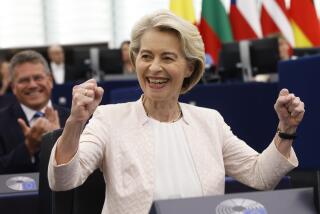European Union Hammers Out a New Charter
- Share via
AMSTERDAM — At grueling talks, leaders of the European Union, the world’s largest trading bloc, managed to agree in the wee hours today on a new charter so they can start negotiating to admit more members.
Grander visions, however, of the organization taking command of the continent’s defense and foreign policy were stymied by some disapproving countries, including Britain. “We will prevent anything that undermines NATO as a cornerstone of our defense,” said a British official traveling with Prime Minister Tony Blair.
The draft treaty adopted here, the updating of a landmark 1991 pact negotiated in another Dutch city, Maastricht, is intended largely to streamline EU decision-making so that the organization, already decried for its unwieldiness and bureaucracy, can function after it grows even bigger.
At least 10 countries--from Turkey to the former Soviet satellites of Hungary, Poland, Romania, the Czech Republic, Slovakia and Bulgaria--have lined up to apply for admission, seeing the trade bloc as a quick route to prosperity and closer integration with the richer nations to the west.
But the leaders, though they labored until shortly after 3:30 a.m., couldn’t agree on new voting procedures to give the EU’s most populous countries--Britain, Germany, France, Italy and Spain--greater say in fixing policy. At present, 200,000 Luxembourgers have as much representation as 8 million Germans. The big countries’ demands for more votes will be postponed at least until new members join, said Dutch Prime Minister Wim Kok, the summit’s official host.
To compensate for the disproportionate representation, the larger countries each now have two European commissioners, who run the EU’s Brussels-based offices, while the smaller states have just one apiece. Kok told a post-summit news conference that the participants agreed that there should be only one commissioner per member state, big or small, when new countries start joining.
When the EU’s membership exceeds 20, there will have to be an entirely new review of how it functions, how many votes each member has and what further improvements are necessary, Kok said.
Today’s decisions, though incomplete and a clear retreat from the ambitions for an institutional overhaul contained in the original treaty draft, are sufficient for beginning negotiations on admitting new countries, European Commission President Jacques Santer of Luxembourg said.
“We have begun in Amsterdam a new phase that in a few years will lead to enlargement of the European Union,” Santer said. On July 16, he said, the commission will submit its opinion on which candidates are best qualified. The first to be chosen should enter the union early in the 21st century.
The presidents and prime ministers, meeting at the Netherlands central bank headquarters in the heart of Amsterdam’s web of canals, also agreed on a vague call for closer ties with the Western European Union, a largely inactive defense grouping made up of the continent’s NATO members.
A majority of trade bloc members, spearheaded by France, had wanted a merger of the EU and WEU, to give Europe an embryo of its own military organization alongside the U.S.-dominated North Atlantic Treaty Organization.
The British demurred. “Europe has not proved it can run a common foreign policy, let alone a common defense policy,” said Blair. Traditionally neutral Ireland, Sweden, Finland and Austria also did not want the EU mixed up in military affairs, with the Nordic countries worried that such a move might needlessly provoke Russia.
The language finally adopted in the treaty, which still must be formally signed and ratified by the EU members, mentions the “possibility” of a merger at an unspecified time in the future, which one diplomat said could mean postponing it forever.
The EU leaders also concurred on a Dutch-brokered compromise to appoint a little-known functionary of the European Commission, Juergen Trumpf of Germany, to represent the trade bloc abroad. Trumpf is secretary-general of the European Commission, the policymaking body of the larger EU, and will remain in that position.
On Monday, the summit’s opening day, French President Jacques Chirac had demanded that Europe’s “Mr. Common Foreign and Security Policy” be someone of “sufficient standing” to attract the global limelight.
Since last year, France and Germany have lobbied for the appointment of a prominent European as the EU’s public face and voice for a common foreign policy, a need many Europeans have felt sorely since their countries failed to act in concert to halt the bloody civil war in the former Yugoslav federation.
The Amsterdam summit, which was supposed to end Tuesday afternoon, got underway in earnest after feuding France and Germany agreed Monday not to block the scheduled launch of the single European currency on Jan. 1, 1999.
Indications emerged Tuesday that the agreement merely papered over the two countries’ differences. French Finance Minister Dominique Strauss-Kahn, in a radio interview, said he opposed using “solely accountant’s” rules to decide which countries could be allowed to use the euro, seemingly making light of Germany’s insistence on strict fiscal criteria to safeguard the currency’s value.
France’s minister for European affairs, Pierre Moscovici, told another radio interviewer that his country might not convert to the euro at all.
More to Read
Sign up for Essential California
The most important California stories and recommendations in your inbox every morning.
You may occasionally receive promotional content from the Los Angeles Times.










